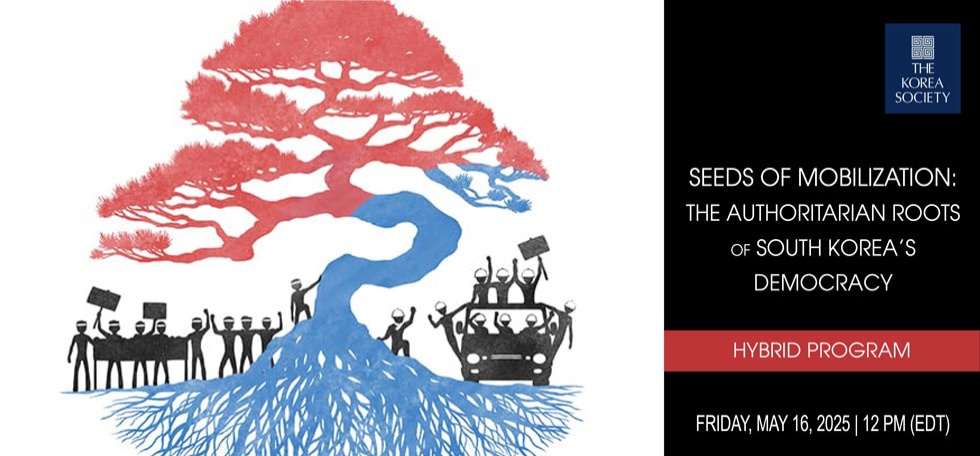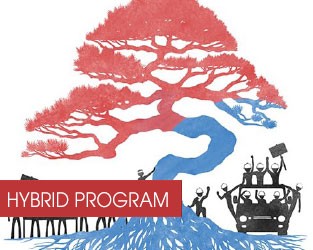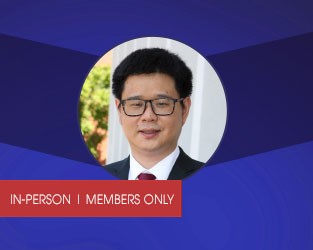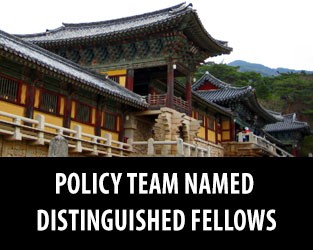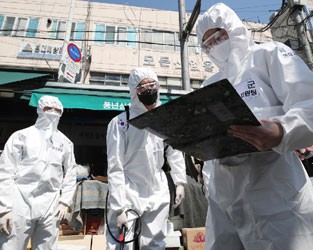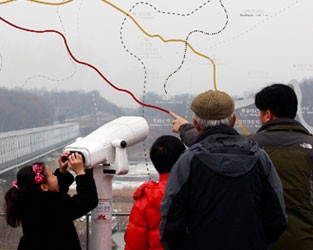![]() On September 21, 2009, His Excellency LEE MYUNG-BAK, 17th President of the Republic of Korea, spoke in New York at a program presented by The Korea Society, Asia Society, and the Council on Foreign Relations.
On September 21, 2009, His Excellency LEE MYUNG-BAK, 17th President of the Republic of Korea, spoke in New York at a program presented by The Korea Society, Asia Society, and the Council on Foreign Relations.
Meeting with H.E. Lee Myung-bak
Podcast
Thank you, Mr. Rubin. Thank you for those warm remarks.
It's a great honor and a privilege for me to be invited by the three institutions -- very, very thankful for your invitation. The last time I was in CFR was in March of 2006. Back then I was mayor of Seoul and had an opportunity to speak before you here at CFR. It's been a little over two years, and now today I'm back at the CFR.
What I would like to do, ladies and gentlemen, today is to talk about the Korea-U.S. alliance and also share with you my vision for the future of the Korea-U.S. alliance as well.
Ladies and gentlemen, next year we commemorate the 60th anniversary of the Korean War. More than 37,000 young American soldiers came to defend a country they never knew and a people they never met. And so that is why the Korean War must never be a forgotten war.
The very first chairman of the Korea Society, General Van Fleet, lost his son in -- (inaudible) -- used to be a B-29 bomber pilot who died while in battle to defend Korea. Among those who took part in the Korea War, 142 of them were sons of active American generals. And out of these 142, 35 of them were either killed or wounded in battle.
These brave soldiers defended freedom and liberty in Korea. And following in their footsteps, today there are more than 27,500 American men and women in uniform serving in the Republic of Korea, helping us defend our freedom and ensure our security. Many of them are doing what their grandfathers and fathers did by serving in Korea. And, of course, one of them is the current U.S. force commander, General Walter Sharp.
What these and many other Americans did was to help lay the foundation for freedom and democracy to bear fruit in the republic. The United States was the stepping stone that made possible Korea's ascent into prosperity, and herein lie the strength and the foundation of our alliance. The United States and the Republic of Korea share values, and we fought together side by side to defend these values. This is what makes our alliance so resilient and enduring.
The combination of U.S. assistance and Korea's determination and hard work led to phenomenal growth in all aspects. Korea was one of the poorest countries in the world, with a per capita GDP of less than 50 U.S. dollars in the 1950s. Now Korea became a country with a per capita GDP of close to $20,000; the size of its economy near the top 10 in global terms. Korea is also now a member of the G-20 and serving as one of the chairs of the troika of all the countries that gained independence.
Following the end of the Second World War, Korea was the only country to have achieved both democracy and industrialization. From a country that sustained itself through the largess and generosity of others, we now hope to become a nation that gives back. The remarkable accomplishments that we managed to achieve in half a century is something that we as Koreans are all proud of. It is also something for you as Americans to be proud of.
Distinguished guests, the alliance made in 1954 was a military alliance borne out of a desperate need to defend the country from aggression. It was an alliance forged to protect Korea from the threat of communism after the peninsula was divided into two following the Korean War. It was a security alliance to manage the balance of power on the Korean peninsula and in the Northeast Asian region in an age when the world was fighting a cold war.
Last June President Obama and I agreed to adopt a joint vision for the future of the alliance during our summit meeting in Washington, D.C. What we agreed by adopting this vision was that we will work towards making this alliance into something that will positively contribute to promoting peace and prosperity around the world.
We also agreed that this alliance will no longer just be about ensuring security, but much more. It will continue to carry out its purpose of securing peace, but at the same time it will be a comprehensive strategic alliance for the 21st century that encompasses economic, social, cultural, educational, scientific and technological cooperation.
The future vision of this alliance is the common road map for the future of our partnership. This partnership has been tested throughout the last 55 years -- the Cold War, post-Cold War, 9/11 -- and, as such, has shaped the need and determined the scope of our alliance.
Now we are called upon to transform this alliance into a more mature and future-oriented alliance. Now the Republic of Korea and the United States will work to protect and promote values which we both believe in. We will work together so that we can make substantive contributions to issues like global issues such as climate change, eradicating terrorism, stopping nuclear proliferation, fighting the spread of drugs, and fighting the spread of disease.
And for this, Korea will expand its contributions to the international community. We will share our development experience with those who are seeking to get on the path to sustainable development so that they can find a model that is suitable for them to attain sustainable development.
And also, the Republic of Korea will increase our financial assistance of ODA. By 2015, we will increase it by three-fold.
And Korean soldiers are taking part in U.S. peacekeeping efforts, as well as multi-national coalitions in 13 parts of the world, preventing outbreak of conflict, taking part in peace-building -- peaceful reconstruction, providing agricultural and medical services to remote parts of the world.
And also another critical issue that faces us is the issue of tackling global climate change. And that is why the area of "green growth" in an area where our two countries can further expand our cooperation. The Republic of Korea has set forth a new national vision, and will vigorously pursue this long-term goal, focusing on our low-carbon green-growth future, focusing on clean technologies, smart grids and green vehicles, as well as nuclear energy.
Korea will, of course, seek closer cooperation with the U.S. in developing such technologies. This is significant not only for closer bilateral ties, but also part of our common goal and responsibility in seeking out a new engine of growth for the future.
Distinguished guests, exchange between people of our two countries have been expanding. Every year, 1.4 million people visit each other. Last year Korea became a member of the Visa Waiver Program being implemented by the U.S. government, and this has led to increased people-to-people exchanges. The number of Korean students studying here in the United States is on a par with countries that are much larger than Korea, like China and India.
However, trade between Korea and the U.S. has been faltering a little bit in recent times. Our trade volume has risen twofold, however our trade with the United States -- which used to be our largest trading partner, in the same period of time, over the last eight years or so, has only increased twofold.
This figure is rather small because this makes the United States the fifth largest trading partner for the Republic of Korea. The Korean trade volume stands at $83 billion U.S. dollars, and now this makes Korea the seventh trading partner when viewed from the United States.
This comparatively slow increase in bilateral trade can be dramatically increased through the passage and the implementation of KORUS FTA. The KORUS FTA contains strengthened provisions on investment guarantee, and tools that will protect intellectual property rights. These are measures that will promote bilateral investments, and, of course, increased trade and investment will also contribute to creating quality jobs here in the United States.
The KORUS FTA will further consolidate the expansion and cooperation between the U.S. with a region that is dynamic and vigorous like the Northeast Asian region. The KORUS FTA will elevate the Korea-U.S. alliance into one that goes beyond the military security alliance. It will become the catalyst in making this alliance into a comprehensive, strategic alliance that encompasses economic and social aspects as well.
It is my sincere wish that our governments will continue to work together with such shared vision so that this agreement can be ratified and implemented at the earliest possible date.
Ladies and gentlemen, today the Korean Peninsula is the only divided region in the world. Another important task that our alliance must address is to bring an end to this division and to lay the foundation for a permanent peace on the Peninsula. And for us to achieve this peaceful unification, we must first attain the goal of a Korean Peninsula free of nuclear weapons, and this why North Korea must abandon all its nuclear programs, and we must convince them to do so.
Unfortunately, we do not find any signs anywhere that North Korea has such intentions. Up until now, the North Korean nuclear -- (inaudible) -- has gone through the same predictable pattern, a pattern oscillating between dialogue and tension. We made progress, only to take backward steps. The North Koreans made pledges, only to rescind.
We did not touch the fundamental issue, which is the complete dismantlement of North Korea's nuclear weapons program. Instead, we compensated them for agreeing to freeze their programs, and we compensated them for not keeping their promises. And sadly, we cannot go back to our traditional negotiating pattern. We must not repeat our mistakes that we made during the last 20 years.
And this is the reason why I proposed, during my last summit meeting with President Obama on the meeting of the "five parties," within the Six-Party Talks framework, the "five parties" must come to a clear understanding, agree on a specific action plan with an aim to achieve full dismantlement of North Korean nuclear weapons program.
We must have a comprehensive and integrated approach to fundamentally resolve the North Korean nuclear issue. Through the Six-Party Talks, we must first dismantle the core component of the North Korean nuclear weapons program, and we will then be ready to provide North Korea with security assurances, as well as international assistance. This is what we mean by a "grand bargain."
I made it clear once again, during my National Day speech delivered last August, that I am prepared to pursue a new peace initiative if North Korea makes that strategic decision to fully and irrevocably give up their nuclear ambitions. This new initiative will greatly improve the lives of ordinary North Koreans and bring about fundamental change.
The North Koreans mustn't consider our proposal as a threat to their regime or as an attempt to isolate them. Once North Korea gives up their nuclear programs and ambitions, they will begin to enjoy a new relationship with the rest of the world. This is the only way for them to ensure their own survival, and the only way for them to get on the path to sustainable development. When North Korea commits to this goal, no country will be hostile to them. They will be welcomed by the international community.
Those of us taking part in the Six-Party Talks must continue to work closer together so that North Korea understands this. They must accurately read what is unfolding, and promptly make that critical decision. And, in this regard, the role of the host of the Six-Party Talks -- China, has become that much more important.
And, of course, Korea will continue to do all that it can. And when we talk and cooperate with the North Koreans, resolving the North Korean nuclear issue will remain as one of the key agendas. President Obama and I share the same view on ways to resolve this issue, and that is why Korea-U.S. cooperation will be further strengthened.
The latest U.N. Security Council resolution will, of course, continue to be faithfully implemented while encouraging North Korea to take that important step. North Koreans are facing not a threat, but an opportunity. North Korea must not throw away what may be their last chance.
Ladies and gentlemen, pretty soon the Korea-U.S. alliance will be handed over to a generation that never experienced war or the harsh reality of the Cold War. Countries in Northeast Asia will be led by the post-war generation and we will see a change of leadership in these countries. Japan, for instance, has succeeded in changing its leadership for the first time in 55 years; and China, last week, through their central committee, has consolidated its fourth generation of leadership.
A new era calls for new kinds of cooperation, and strengthened cooperation requires that we have more dialogue and more understanding of each other. The Northeast Asian region is no longer the stage where opposing ideologies collide. We must now look towards the same goals, and face the same challenges together, and work together. This is the way to foster a cooperative network that will resolve issues of common concern and assure our common prosperity.
And in such times, the strategic role of the United States is more important than ever, not only on the Peninsula but throughout the region. And such an environment also provides for an opportunity for the U.S. to contribute more broadly to expanding this alliance. Korea and the U.S. are embarking on a new journey, one aimed at promoting peace around the world. Let us be proud of what we achieved together over the last decades, and now let us prepare to set sail to open up new horizons.
Lastly, I am here to attend the 64th U.N. General Assembly, and we all hope for the success of the climate change meeting so that we can ensure success of the Copenhagen meeting at the end of this year. And also the Pittsburgh G-20 meeting will be an occasion for the world leaders to discuss ways to escape, and resolve, and for us to come out of the global current crisis. Thank you very much.
" target="_blank">iTunes RSS Download
